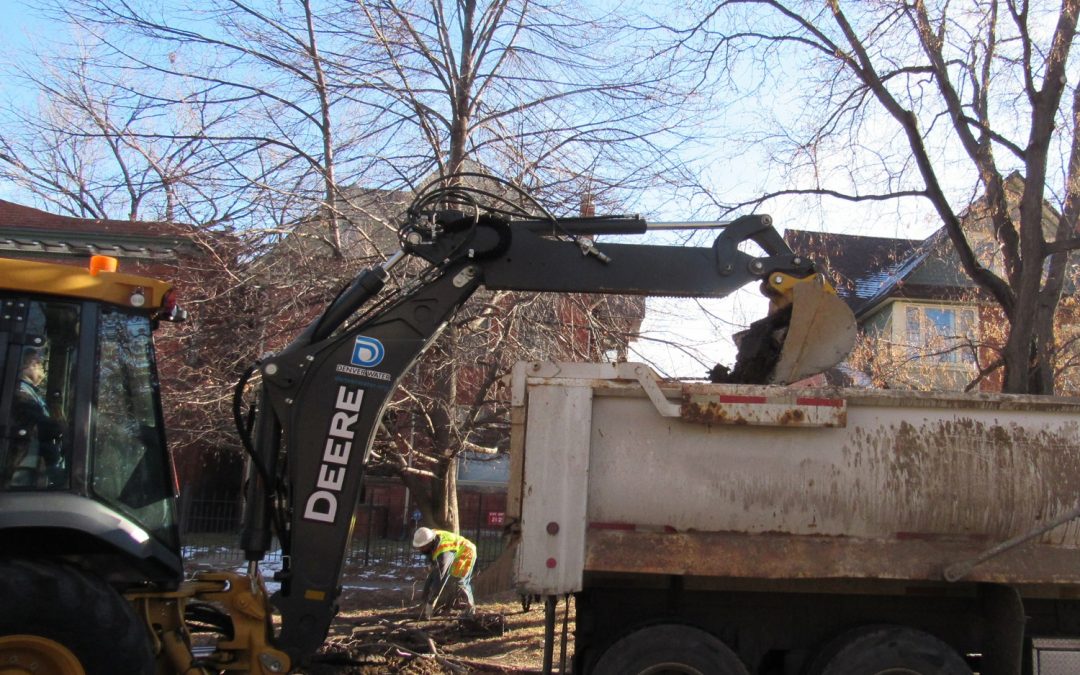One year after it launched one of the largest lead treatment programs in the United States, Denver Water is slightly ahead of schedule, having installed 4,500 new service lines, a key factor in eliminating lead in the water supplies of thousands of area homes.
The Colorado Department of Public Health and Environment said the program is showing significant, early reductions in lead in tap water thanks to the pipe replacements and the distribution of thousands of free water filters.
“It was going to be daunting even in a non-pandemic year,” said Denver Water CEO Jim Lochhead. The original first-year goal had been 4,477 installations.
Lead isn’t present in the water treated by the Denver utility, but like in other cities, the contaminant leaches into tap water as it travels through aging service lines owned by customers.
Denver, which is Colorado’s largest municipal water utility, has known lead was present at the tap in customers’ homes since it appeared in routine sampling in 2013. The levels exceeded the benchmarks set under the Safe Drinking Water Act.
For several years, the utility ran pilot tests and negotiated with the Colorado Department of Public Health and Environment (CDPHE) and the U.S. Environmental Protection Agency over how best to eradicate the harmful metal. Though the amounts of lead found in Denver’s tap water samples varied, no amount of lead is considered safe to ingest, especially for young children.
Cities across the country, including Pittsburgh, Newark, N.J., and Washington D.C., have been dogged by an increase in lead contamination as service lines age and corrode, allowing the lead to seep into residential water lines, eventually reaching taps.
The CDPHE issued an order in 2018 requiring Denver to begin adding phosphorous to its water, one of the most effective ways to reduce corrosion in pipes. But phosphorous is also a pollutant and causes problematic algae blooms in lakes and rivers. Adding it to the municipal drinking water supply would also make it harder for waste water treatment operators to meet their own obligations to keep phosphorous out of rivers and streams.
Due to those concerns, Aurora, the Metro Wastewater Reclamation District, The Greenway Foundation, and eventually Denver, sued the CDPHE in 2018 to stop the order from taking effect.
The dispute was settled after Denver was able to obtain a rare variance under the federal Safe Drinking Water Act in exchange for agreeing to invest some $75 million over 15 years to replace lead service lines, offer free water filters to residents as they wait for the new lines to be installed, conduct community education programs, and increase the pH of the water supply to also help reduce corrosion in pipes.
In earlier negotiations the utility had proposed replacing the lines at a much slower rate that would have taken decades to complete.
Ron Falco, safe drinking water program manager at the CDPHE, said he’s pleased with the progress Denver has made.
“The pH control and the lead levels have come down, so it’s been a terrific year, especially considering that they had to face this pandemic,” Falco said.
Denver has two more years to demonstrate to the EPA that it is meeting all the goals of the variance, at which point the program will continue through the final 12 years.
“Even if you haven’t had your lead service line removed, you still have the opportunity to consume very little lead,” Falco said, pointing to the distribution of roughly 100,000 filters and a use rate of nearly 80 percent. “Overall exposure should be dramatically less than it was just a year ago.”
Denver estimates it may have as many as 84,000 customer-owned lead service lines throughout its system. Replacing them can cost $5,000 to $10,000, according to Denver Water, and usually requires digging up streets and yards. Johnny Roybal, a water distribution supervisor who oversees one of the replacement crews, said the work varies from site to site.
On a good day, he said, the crew can complete work on four homes. On a more complicated day, if access is limited, or equipment malfunctions, completing one home’s service line replacement can take all day.
The lines identified for replacement exist largely in some of the city’s older neighborhoods, where they can date back to the late 1890s.
The utility has created a searchable map that allows anyone to insert an address to see if the business or residence has or is likely to have a lead service line.
Fernando Pineda-Reyes is CEO of CREA Results, a firm that specializes in educating underserved, low-income communities on public health issues.
CREA is one of the contractors hired by Denver Water to help educate non-English speaking customers and others about the benefits of the water filters and the lead service line replacement program.
“When you tell people there is going to be a big hole in their front yard, they’re not usually excited about it,” Pineda-Reyes said. “But when they find out what is going on, we haven’t found anyone who objects. It is free to them and they know they’re children will be protected.
“So many programs stop at awareness and education,” Pineda-Reyes said. “With this one we have the privilege to see it start and end with prevention.”
Jerd Smith is editor of Fresh Water News. She can be reached at 720-398-6474, via email at jerd@wateredco.org or @jerd_smith.
Fresh Water News is an independent, nonpartisan news initiative of Water Education Colorado. WEco is funded by multiple donors. Our editorial policy and donor list can be viewed at wateredco.org


 Print
Print